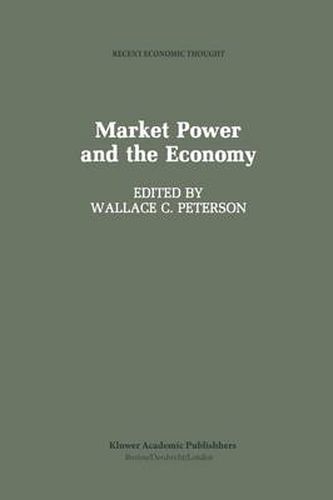Readings Newsletter
Become a Readings Member to make your shopping experience even easier.
Sign in or sign up for free!
You’re not far away from qualifying for FREE standard shipping within Australia
You’ve qualified for FREE standard shipping within Australia
The cart is loading…






This title is printed to order. This book may have been self-published. If so, we cannot guarantee the quality of the content. In the main most books will have gone through the editing process however some may not. We therefore suggest that you be aware of this before ordering this book. If in doubt check either the author or publisher’s details as we are unable to accept any returns unless they are faulty. Please contact us if you have any questions.
A situation in economics that is little short of scandalous is the almost total neglect by mainstream economics of the importance of power in economic affairs. Power in this context means the ability to bend market forces in one’s favor, influencing and shaping key economic variables such as prices, wages, and other income determinants. As John Kenneth Galbraith as tutely observes: a dominant fact in economic life is the desire of people everywhere and in all circumstances to get control over their personal lives and their incomes-to escape from the tyranny of the market.
Power is the means to this end. Ever since Adam Smith, economists have been fascinated by and lavish in their praise for the workings of the market. All modern textbooks are built around Smithian ideas about markets and the way the invisible hand works through competition for society’s better ment. Yet one can search nearly in vain through leading texts, under graduate and graduate alike, for any reference to market or economic power. This is the situation in spite of the fact that the drive for power, the urge to get control over one’s income, permeates the economy as much as does competition. This is a scandal! For a discipline that claims for itself the mantle of a science-one which wants to be accorded the same respect given the natural sciences-it is almost incomprehensible that it should ignore a major force at work in the real economic world.
$9.00 standard shipping within Australia
FREE standard shipping within Australia for orders over $100.00
Express & International shipping calculated at checkout
This title is printed to order. This book may have been self-published. If so, we cannot guarantee the quality of the content. In the main most books will have gone through the editing process however some may not. We therefore suggest that you be aware of this before ordering this book. If in doubt check either the author or publisher’s details as we are unable to accept any returns unless they are faulty. Please contact us if you have any questions.
A situation in economics that is little short of scandalous is the almost total neglect by mainstream economics of the importance of power in economic affairs. Power in this context means the ability to bend market forces in one’s favor, influencing and shaping key economic variables such as prices, wages, and other income determinants. As John Kenneth Galbraith as tutely observes: a dominant fact in economic life is the desire of people everywhere and in all circumstances to get control over their personal lives and their incomes-to escape from the tyranny of the market.
Power is the means to this end. Ever since Adam Smith, economists have been fascinated by and lavish in their praise for the workings of the market. All modern textbooks are built around Smithian ideas about markets and the way the invisible hand works through competition for society’s better ment. Yet one can search nearly in vain through leading texts, under graduate and graduate alike, for any reference to market or economic power. This is the situation in spite of the fact that the drive for power, the urge to get control over one’s income, permeates the economy as much as does competition. This is a scandal! For a discipline that claims for itself the mantle of a science-one which wants to be accorded the same respect given the natural sciences-it is almost incomprehensible that it should ignore a major force at work in the real economic world.